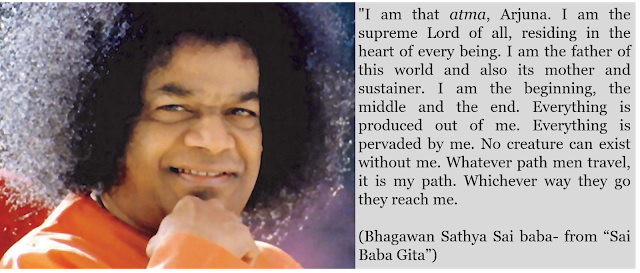Verse 4
Adhibhootam
ksharo bhaavah
Purushashcha
adhi daivatam;
Adhiyajno’hamevaatra
Dehe
dehabhritaam vara.
Adhibhuta
(knowledge of the elements) pertains to My perishable Nature, and the Purusha
or soul is the Adhidaiva; I alone am the Adhiyajna here in this body, O best
among the embodied (men)!
ADHIBHOOTA
The perishable world is the adhibhuta prapancha. All
the world of names and forms, including this body, is perishable. It is under
mutation; it is a flux. It is a continuity of a succession of events, and no
object in this world can be said to be existing individually or independently
even for a second.

 Persons like Buddha have highlighted this aspect by
saying that the world is like a flowing river, where we cannot touch the same
water the next moment. Like a flame that is burning and every minute, every
second, there is a new set of atoms of fire rushing forth, the world is not a
total indivisibility, but a movement. As a flame is a movement, as water in the
river is a movement, the world is a movement. Therefore, it is perishable
because when it moves, it is conditioned at every minute into bits of process.
Persons like Buddha have highlighted this aspect by
saying that the world is like a flowing river, where we cannot touch the same
water the next moment. Like a flame that is burning and every minute, every
second, there is a new set of atoms of fire rushing forth, the world is not a
total indivisibility, but a movement. As a flame is a movement, as water in the
river is a movement, the world is a movement. Therefore, it is perishable
because when it moves, it is conditioned at every minute into bits of process.
ADHYATMA
The word Adhyatma can be split into Adhi+Atma.
Beyond everything that a human mind can think of, there
is
the Supreme, which is being eternal, is also imperishable. And
that Supreme is none other than Brahman.
The universe of which all the beings form a
part, is a physical manifestation of that Brahman. Since we are a part of this
universe, there has to be a component of that Brahman in all of us.
And that component is Adhyatma
(When we the drawings have superimposed ourselves on the
pure canvas Brahman, it is but natural that in all of us, there has to be
Brahman, the part of that pure canvas on which we have superimposed ourselves)
ADHIDAIVA
 There is a Supreme adhidaiva who brings
everything together into a hierarchy of divine operations, even when the
different Gods act. Indra, Varuna, Mitra, Surya, Agni, Devi, Narayana, Vishnu,
Siva, Ganesha — all these divinities represent facets of the Supreme Absolute,
and they have to be put into a pattern of harmonious action so that one will
not do something which would contradict what the other does. Gods do not
contradict themselves.
There is a Supreme adhidaiva who brings
everything together into a hierarchy of divine operations, even when the
different Gods act. Indra, Varuna, Mitra, Surya, Agni, Devi, Narayana, Vishnu,
Siva, Ganesha — all these divinities represent facets of the Supreme Absolute,
and they have to be put into a pattern of harmonious action so that one will
not do something which would contradict what the other does. Gods do not
contradict themselves.
Siva does not contradict what Ganesha does, nor does
Ganesha contradict what Narayana does. There is a harmony of principle in the
mode of behaviour and action of these Gods. They are all conditioned by a
supreme constitution of the Absolute, and that is the adhidaiva.
ADHIYAGNA
Yajna here means the "act of perception,
feeling, or thought." As in the Yajna, here also oblations --- the
sense-objects --- are poured into the Yajna altar --- the sense-organs --- when
the Devata --- the particular faculty in it --- gets propitiated and invoked,
and as a blessing from it we gain the "fruit" thereof, viz., the
knowledge of the perception. In this Adhiyajna, in the subjective Yajna-act of
perception, it is quite evident that the One Vital Factor that dominates the
entire activity is the Self, the Principle of Life.
The spirit of sacrifice in human also originates from the
Supreme, that is Brahman. Adhiyagna simply means the spirit of sacrifice
originating from the Supreme.
Love.






